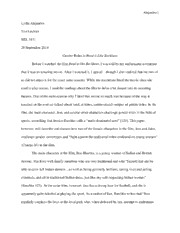
Preview REL4.pdf (PDFy mirror)
Alejandro 1 Lydia Alejandro Tori Lockler REL 3111 29 September 2014 Gender Roles in Bend it Like Beckham Before I watched the film Bend it like Beckham, I was told by my enthusiastic roommate that it was an amazing movie. After I watched it, I agreed—though I also realized that the two of us did not enjoy it for the exact same reasons. While my roommate liked the movie since she used to play soccer, I used the readings about the film to delve a bit deeper into its recurring themes. One of the main reasons why I liked this movie so much was because of the way it touched on the ever-so-talked-about (and, at times, controversial) subject of gender roles. In the film, the main character, Jess, and several other characters challenge gender roles in the field of sports, something that Jessica Raschke calls a “male-dominated area” (124). This paper, however, will describe and discuss how two of the female characters in the film, Jess and Jules, challenge gender stereotypes and “fight against the traditional roles conferred on young women” (Chacko 84) in the film. The main character in the film, Jess Bhamra, is a young woman of Indian and British descent. She lives with family members who are very traditional and who “[insist] that she be able to cook full Indian dinners…as well as being generally brilliant, saving lives and jailing criminals, and all in traditional Indian dress, just like any self-respecting Indian woman” (Raschke 123). At the same time, however, Jess has a strong love for football, and she is apparently quite talented at playing the sport. As a matter of fact, Raschke writes that “Jess regularly outplays the boys at the local park who, when defeated by her, attempt to undermine Alejandro 2 her with sexist comments” (124). The fact that Jess plays football (and that she is better at it than her male friends) is the main example of how she challenges gender roles throughout the film, especially since football is a “male-dominated sport” according to Raschke (124). In addition, Jess plays football to the dismay of her traditional Indian family. Her mother especially dislikes the fact that she plays football, and she would rather see her daughter cooking “round chapattis” or getting ready to marry an Indian man, much like Jess’ older sister, Pinky. When Jess sneaks out of her house to play football in the park and, later in the film, to play with her fellow teammates on the field, she is openly and blatantly “breaking away from tradition to play football” (Chacko 82). Mary Ann Chacko writes that women, in Eastern cultures, “became a metaphor for the sanctity of the home or the inner sphere while the outer sphere was a male domain” (82). Applying this quote, one can then realize that Jess is abandoning this “inner sphere” in exchange for playing the sport that she loves—something that exists in the outer “male domain.” Thus, she is challenging the role of a typical Indian woman who remains indoors to cook and to keep the household in order. Jess’ friend, Jules, also challenges gender roles throughout the film. Although Jules is also a football player (and therefore she challenges gender roles in the same way as Jess does), her personal mannerisms and preferences are atypical of what one might consider the usual feminine woman. As Raschke writes, “Jules’ mum wants her to wear frilly, lacy bras, where Jules is content in the sturdy and reliable sports bra” (126). In other parts of the film, one can see that Jules still does not dress in a particularly feminine manner—for example, choosing to wear her best pair of slacks instead of a dress or skirt when she goes to Pinky’s wedding to surprise Jess. She never wears dresses, in fact—when she and the rest of the team go clubbing in Germany, she is clothed in a shirt and pants. Later in the film, Jules’ mother becomes worried Alejandro 3 that her daughter’s love for football is turning her into a lesbian. As one can see, however, Jules’ mother’s worries are all in vain, as Jules is never a lesbian to begin with. Thus, Jules proves to her mother that playing a sport does not automatically make a woman a lesbian or any less feminine than a more typical woman. Jules has plenty of feminine moments throughout the film, such as her crush on her coach, Joe. In conclusion, though Jess and Jules love to play football and are skilled members of their team, they both find themselves in different situations in which they challenge gender roles differently. This movie is inspiring in that it proves that society keeps changing and thus the roles of women in society change as well. In the midst of a rapidly developing society, women may find more opportunities to challenge gender norms and become just as recognized as their male counterparts for their efforts, unique qualities, and actions. Alejandro 4 Works Cited Chacko, Mary Ann. “Bend It Like Beckham: Dribbling the Self Through a Cross-Cultural Space.” Multicultural Perspectives 12:2 (2010): 81-86. Web. 29 Sep. 2014. Raschke, Jessica. “Juggling Cultures in Bend It Like Beckham.” Screen Education 36 (2004): 123-126. Web. 29 Sep. 2014.
